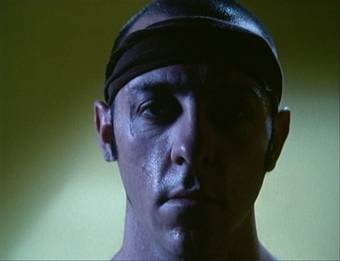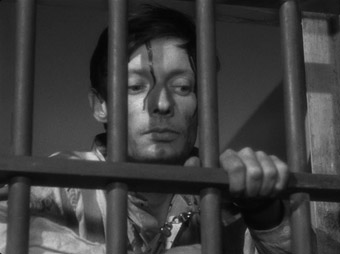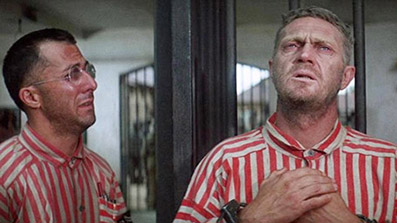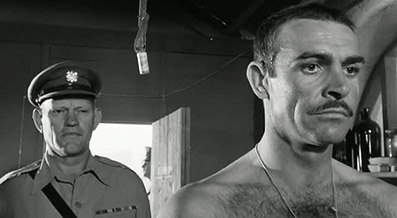There is, as Camus rightly observes in his terrific review of Arrow's Blu-ray release of Jules Dassin's Brute Force, something about prison movies that aligns us with the inmates every time, no matter what crime they may have committed. Well some of them, anyway – there are always a couple of absolute monsters in the cell block in question to put the frighteners on the audience identification figure, large and dangerous men we'd run like a triathlete to avoid if we encountered them on the outside. But in this walled-off microcosm of society, the prisoners tend to be cast as the oppressed proletariat, the guards as their military overseers, and the warden as a merciless dictator. In such a world, who wouldn't identify with the rebellious inmates?
Choosing five favourite prison movies each was a tough job, not because we couldn't think of any but because we had so much trouble nailing it down to five. But such are the rules of my own making. We always write these lists independently of each other (the 200 miles that sits between us tends to ensure that) and thus do run the risk of having the same titles on both lists, so this time decided to compare notes before proceeding to avoid such a conflict. Surprisingly there was next to no crossover, and there was even considerable variance in our chosen backup titles, albeit with a few very notable exceptions. And while I can't speak for Camus (who is currently editing film in lands afar), every film on his list could just as easily have ended up on mine.
For the record, here are a few of the titles that so nearly made the final cut: Brubaker, The Birdman of Alcatraz, Merry Christmas Mr. Lawrence (yep, we're including military prisons and prisoner of war camps),The Green Mile, The Shawshank Redemption, Kiss of the Spider Woman, The Longest Yard, Cool Hand Luke, Hunger, Bronson and, of course, Dassin's Brute Force. Most are set almost exclusively in prisons, but I've been a bit cheeky and included one whose prison scenes make up only part of the running time, largely on the basis of its importance and undeniable greatness as a movie.
As ever this is not intended to be a definitive list, just five very personal favourites apiece, all pulled from warm memories without recourse to the internet. There'll be others we'll think of later that we'll wish we'd included, but they can have their own secondary list later.
And so to the films.
Un prophète [A Prophet] (Jacques Audiard, 2009)
Jacques Audiard's extraordinary prison movie arrived in the UK on a wave of enthusiastic reviews and yet still it managed to surpass my expectations. Tahar Rahim established himself as an actor to watch (check him out in Asghar Farhadi's superb The Past for confirmation) as Malik, a young Franco-Arabic petty criminal arriving for his first spell in an adult prison, where he is quickly and forcibly recruited by Corsican big shot César Luciani (a marvellous Niels Arestrup) and ordered to get close to and murder a protected fellow Arab who is due to testify against the Mob. Distrusted by the Muslims and looked down on by the Corsicans, Malik effectively remains an outsider in both camps, but learns well from precarious father figure César, as the film charts his bumpy and sometimes terrifying journey from put-upon nobody to major player with a grip and attention to detail that is consistently riveting. Audiard adds to the sense of realism by peppering the supporting cast with genuine convicts, a trick borrowed by Daniel Monzón for his noteworthy and too often overlooked Cell 211. Five years after it was made, Un prophète is still the modern prison movie against which all others should be judged.
DVD review >>

Ghosts... of the Civil Dead (John Hillcoat, 1988)
About as dark and uncompromising as prison movies get, this astonishing early feature from Australian director John Hillcoat went largely unseen outside of its home territory on its initial release, but has found some retrospective appreciation following Hillcoat's critical success with the more widely seen The Proposition and The Road. Quite possibly the most claustrophobic portrayal of prison life you'll find in a dramatic feature, its portrait of the maximum security wing of a modern jail in which the brutalisation of inmates eventually explodes into violence is grimly realistic and seething with tension, but is shot in a precision framed manner that feels chillingly observational, like a dispassionate observer coolly watching as society crumbles before their eyes. The film also marked Hillcoat's first collaboration with singer-songwriter Nick Cave, who co-wrote the screenplay, contributed to the score (naturally), and has a memorable role as a psychotic new inmate. It was inspired by news reports about lockdowns in so-called ‘New Age' American prisons, which also gave birth to...
DVD review >>
Oz (Tom Fontana et al, 1997-2003)
OK, a bit of a cheat I know, but this is not the first TV show to make it onto a High 5 movie list and it won't be the last, and frankly if you're talking about a no-holds-barred depiction of modern prison life at its most extreme, there is no way that Oz could be rightfully excluded. Created by Tom Fontana (who had previously written and produced episodes for St. Elsewhere and Homicide: Life of the Street), Oz has the distinction of being the first one-hour dramatic TV series to be produced in-house by HBO, and in terms of boundary pushing it set the style for some of the channel's most acclaimed later series. Racial hatred, sexual abuse, drug addiction, violence and corruption are all handled in an unflinching and usually explicit manner, and the language was (realistically) stronger than in just about any previous made-for-TV drama. Strong scripts (all of which Fontana wrote or co-wrote), a consistently excellent and ever-changing cast, and some of the most memorable TV drama characters of its day made this compulsive viewing for five too-short seasons. The running time afforded by a series format also allowed for more familiar genre issues and their impact to be explored in more detail than the average film running time allows, but if you prefer your story arcs to cleanly resolve issues and reward the righteous then you've come to the wrong place. Rarely have I ever been more grateful that I've never been banged up in an American prison.

A Man Escaped (Robert Bresson, 1956)
I've never been a fully paid-up member of the Robert Bresson deification club, and still have issues with a couple of his more widely acclaimed later films, but sit me down in front of his 1956 A Man Escaped (full French title: Un condamné à mort s'est échappé ou Le vent souffle où il veut) and I'll fill out the forms and pay the subscription fee in a heartbeat. Set during the Second World War and based on the true-life memoirs of French resistance activist André Devigny, this is minimalist filmmaking at its most gripping, with stock genre characters discarded to focus solely on the lead character, compellingly played by François Leterrier. Bresson observes him as he makes his plans and effects his escape attempt in meticulous detail, with the escape itself playing out almost wordlessly in close to real time, as tense an example of such a sequence as you'll find. This is the prison escape movie stripped of its non-essentials and without a single wasted shot or edit.
DVD review >>
I Am a Fugitive From a Chain Gang (Mervyn LeRoy, 1932)
How many prison themed movies have gone on to impact the true story that inspired them? That was certainly the case with Mervyn Le Roy's devastating 1932 portrait of a victim of injustice who is sentenced to serve out his time on a Georgia chain gang, a hellish existence from which he eventually escapes, only to again become a hunted and haunted man. Made during that brief but golden period for American cinema after the movies learned to talk but before the Production Code was drawn up to gag them, the film may stretch the parameters for inclusion in a list of prison movies, given that only part of it takes place within this environment, but its handling, impact and Paul Muni's lead performance alone buy it a place in my top five. The ending, which I'm not about to give away here, haunted me for years after I first saw the film and remains one of the most chilling in crime film history. Based on the true story of Robert Elliott Burns, the questions raised by the film about the American legal system of the time led to Burns eventually being pardoned and released, while the film's critical view of the penal system in Georgia saw director Mervyn Le Roy and studio head Jack Warner apparently barred from entering the state for many years after.
The Jericho Mile (Michael Mann, 1979)
Ah, being 18. I don't understand how my recall of these movies is so vivid. You must lock some stuff away when you're that age. Things seemed to be all so much more significant then. A huge, award winning success on TV in the States, The Jericho Mile garnered theatrical distribution outside its home country. Directed by Michael Mann (who went on to a stellar movie career), it tells the story of Larry Murphy (played by Peter Strauss, popular at the time after his turn in the TV series, Rich Man Poor Man), a man convicted of killing his father for all the right reasons (to stop him raping his step sister). A loner in prison, he works out his frustrations by running and in no time the rest of the inmates are building him a track because of his extraordinary prowess as a racer. The authorities are convinced he's Olympic class material. I can't easily recall specific details except for two things. Larry's best friend was black (all too rare for TV in the 70s) and his final "Screw you!" to the authorities who won't let him compete is a defiant smashing of a stopwatch as he beats the time of his main competitor. It sticks out in my memory because of its emotional similarity to another runner's story. The "Screw you!" in this case is Tom Courtney in The Loneliness of the Long Distance Runner. At the end of the race, he's beaten everyone and at his moment of triumph (which he knows will be vicariously enjoyed by those he despises) he stops short of the finish line and lets those behind him through. The image of him standing there, hands on hips is inextricably linked with the smashing of the stopwatch in The Jericho Mile. It's well worth looking out for.

Papillon (Franklin Shaffner, 1973)
I was 12 years old in 1973 and I believe the movie was released in the UK in 1974. This was the first movie, certified AA – 14 year olds only – that I managed to get into see ‘illegally'. As a child I had imbued the higher certificate movies with terrifying aspects; images and sounds that only a true adult could witness and hear without needing subsequent psychiatric help, experiences so terrible that youngsters would not be able to process the emotional and physical shocks that awaited them on the screen. Yes. I am older and wiser now but that terrifying sense of squeamishness carried through my teenage years. You do not want to know what The Exorcist did to me… But apart from an abiding love of prison movies probably due to the incarceration keeping men and women in an emotional pressure cooker, there were other aspects that made Papillion stand out. It's the (ahem) true story of Henri Charrière (whose butterfly tattoo explains the title and that he's French, sans doute) and the absolutely terrifying story of his time on Devil's Island (where he wasn't imprisoned so the 'truth' goes). I can still see McQueen's emaciated prisoner floating on his raft waving at his friend to jump off the huge cliff and join him. Incidentally, McQueen performed that cliff jump himself if Wiki and IMdb are to be believed. The fact that it's an ultra wide shot makes me doubt this claim. Apart from the mistreatment suffered by the protagonist, there was another scene that really unsettled me. A child takes things in very differently and although there weren't enough media out there to generate spoilers, I did find out beforehand that there was a scene with lepers. Leprosy, that most biblical of diseases, scared me witless. Bits of you drop off until you appear as a monstrous physical grotesquery. This is a recalled child's view and please understand it as such. So it wasn't the burgeoning relationship between McQueen and Hoffman that stands out so much, it's the extraordinary scene in the leper colony and the exchange between McQueen and the head leper, Toussaint (an unrecognisable Anthony Zerbe). McQueen takes a few drags off a cigar that's been in Zerbe's own mouth. Yum. Toussaint says something like "How did you know the leprosy I suffer from isn't contagious?" and McQueen says "I didn't." Stuff like that stays with you.
Scum (Alan Clarke, 1979)
There's that year again... Alan Clarke's own remake of his once banned 1977 original, Scum features the great Ray Winstone, a fresh faced twenty two year old with none of the bulk usually associated with his later roles. Like Connery getting Bond, Winstone was cast because Clarke liked the way he walked, a swagger that says "I'm a confident, hard bastard so get over it." I can still recall the fear that bloomed inside me like an explosion whenever another boy in school made a threat, idle or otherwise. The few fights I got into (weapon-less I might add) were always preceded by a paralysing fear that melted away once the adrenalin kicked in and the punches started flying. It's a bit like a cold swimming pool, one that makes you shiver as you dip in a wary toe but one in which you're more than comfortable once submerged and oddly 'warm'. Watching the birth of Winstone's reign inside the Borstal (a truly terrifying word in my youth) was something that stunned me seeing Scum for the first time. I think it had to do with the masterful way Clarke covered the violence. It felt like he just opened a door and let it all just simply be in front of you. There's no staccato editing, pretentious camera moves or anything else that sells the thrill of violence and let's not bullshit here, violence has a delicious thrill of its own. There's a tiny piece of trickery that you only realise seeing the film for a second time (if Winstone had actually done what he looked like he did, the actor Phil Daniels would be somewhat dead). Of course I'm talking about the 'billiard balls in a sock' smack down. It is an extraordinary moment in a movie so densely packed with restrained violence, it's a wonder the movie just didn't explode in the projector.
Blu-ray review >>

The Hill (Sidney Lumet, 1965)
There are several noteworthy aspects to The Hill. Let's get the obvious ones out of the way; it's Lumet, a director almost incapable of putting a directorial foot wrong; the opening crane shot which seems to have impossibly moved through a tall fence as it widens out; Connery crowbarring open his Bondage to star in movies his star presence enabled; Michael Redgrave as a caring medic in the sweat hole that is an army prison in the Libyan desert; Ian Hendry as a guard moving up the political ladder via the suffering of the men under his control; Ian Bannen as the screw with a softer heart (with whom Connery starred in another of the Scot's choices while playing Bond, the underrated but superb The Offence). But for all its cruelty, its violence and the breaking of men to build them up again, one aspect always shines brighter than all the rest, the stunned disintegration of Sergeant Major Wilson (played in a career best performance by Harry Andrews) as his disciplined world starts to crumble in front of him. I had this silly little daydream in the late 80s imagining if I was being tongue lashed by Kubrick's sergeant major in Full Metal Jacket, R. Lee Ermey. What, I wondered, as he screamed an inch away from my face, would he do if I kissed him? Just a peck you understand. Purely a hypothetical idea, some way to defuse this theatrical nonsense that seems to work in the armed forces in a way that it surely could not in the civilian world. Yes, a gut punch and a head smack would probably be the answer. It's just struck me that what would be my No. 6 in my High 5 (Merry Christmas, Mr. Lawrence), prisoner Bowie does exactly that to Camp Commander Ryuichi Sakamoto. Perhaps I channelled the idea. It's just that I find the 'sergeant major' type so horribly silly. Not Andrews. He has a belief that what he is doing is good for the men and a man with a belief is a very dangerous animal. I found him utterly convincing and even more so as it occurs to him that Ian Hendry is outmanoeuvring him. At the climactic moment, Hendry actually smiles knowing he has goaded his boss so craftily. Andrews couldn't be more stunned if he saw Rocket the racoon with a machine gun bearing down on him. When he really loses it in the cell at the end, I had to remind myself that Connery was the nominal star (who was very good in the movie) but it's Andrew's extraordinary performance I was more impressed by. In fact I think I'll have another look at that scene right now. Marvellous.
P.S. This is the truth but feel free not to believe me. I wrote the above without recourse to the IMDb page on Andrews. It seems he was BAFTA nominated for one performance in his long and varied career... Care to guess for which role?
Midnight Express (Alan Parker, 1978)
This is on the list for one particular reason taken from a lot of aspects of the film that I find... difficult. This is the so called 'true' story of Billy Hayes (controversial is too tame a word to describe the reception it got) who thought it would be a good idea to strap pounds of hashish to his body and then whilst Turkish customs were on high alert for terrorist threats (doh!), smuggle it out of the country. He got a 30-year sentence. Ouch. Now, there are moral ambiguities in this film worth addressing. Some would say that if you are in a country breaking the law, you better be damn well informed as to what might happen if you're caught (the 'Billy Hayes was an idiot' argument). We are, of course, invited to feel sorry for him. This is because he's not serving time in an American prison but a Turkish one and the film goes some way to tarring an entire nation with the same brutal brush. What goes on in this prison means that we are not in metaphor-land though you'd be forgiven thinking otherwise. Medieval thugs physically dismantle this guy and he has to take on some of his guards' sadism to stay afloat. Giorgio Moroder's memorable score (which I loved at the time) has no doubt dated the film – most of it's in a disco beat. And it's synthesized. I still have a fond regard for it but it date stamps the movie like a franking machine. Anyway, the hard done by American goes through hell and then eventually escapes after a fortuitous shove and a coat hook through the brain of the burly bastard about to sodomize him into the middle of next year. So why is it on this list? Simple. Gerry Hambling. Nominated for Best Film Editing at the following year's Oscars and winning the actual BAFTA, the movie is a triumph of the subtle craft of editing. There are too many examples for me to list but if you want no finer example of why Hambling was at the top of his game, look no further than the arrest at the airport. This is editing as emotional ballet. It doesn't get much better than this. In my capacity as editor of the magazine of the Guild Of British Film and Television Editors, it was my great sadness to publish his obituary in the latest issue but hey, the work lives on. I didn't much like or respect Midnight Express but it was all too obvious that it was cut by a master. |